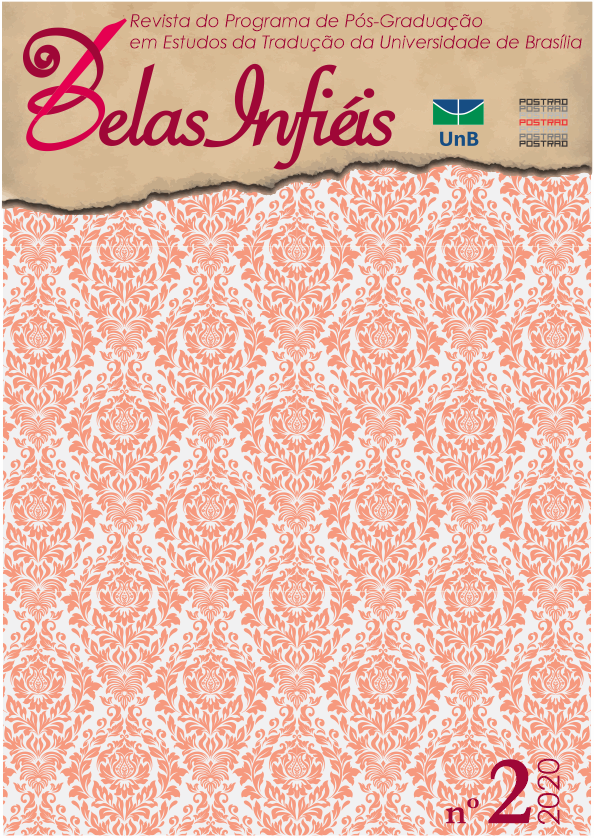Uma nova tradução para Ovídio, Amores 1.8
DOI :
https://doi.org/10.26512/belasinfieis.v9.n2.2020.27209Mots-clés :
Tradução poética. Experimentos de versificação. Ddístico elegíaco. Emulação do ritmo antigo. Elegia latina.Résumé
A presente tradução é parte uma primeira revisão do trabalho tradutório apresentado em dissertação de mestrado (SOUZA, 2016). A proposta foi traduzir os dísticos elegíacos de Ovídio em uma forma que ecoasse o ritmo original do poema latino. Para isso, partiu-se da proposta de Carlos Alberto Nunes, a substituição de longas em posição princeps por tônicas. Porém, nesta tradução, ao contrário da de Nunes, permitiu-se também o seguimento desta tônica por apenas uma átona, formando troqueu que pode ser executado em performance como espondeu. Dessa maneira, a possibilidade de variação no metro foi mantida, mas os dátilos foram mantidos fixos no quinto pé do hexâmetro e segundo hemistíquio do pentâmetro. A cesura obrigatória do pentâmetro datílico foi executada com a aproximação de duas tônicas e enfatizada com espaçamento obrigatório, que induz o leitor ao reinício do ritmo. Para manter o andamento do metro, foram utilizados recursos como deslocamento de tônica, elisão entre o fim do hexâmetro e início do pentâmetro, elisões em geral. A presente revisão apresenta alterações no hexâmetro, que procura executar as suas cesuras, porém com o resultado de várias cesuras femininas. Além disso, o tom do poema procurou maior leveza e fluidez, com a eliminação de hipérbatos radicais e o rearranjo de informações dentro do dístico, que é a unidade dentro do poema. O poema traduzido, oitavo do livro 1, apresenta a figura da alcoviteira, personagem comum na comédia nova latina, que aqui é a presentada como uma bruxa que influencia a amada a extorquir os seus amantes e a desprezar o eu-poético, que sendo poeta, não tem como dar presentes valiosos além dos próprios poemas.
Téléchargements
Références
HOMERO; NUNES, C. A. (trad.) Ilíada. Rio de Janeiro: Ediouro, 1989.
HOMERO; NUNES, C. A. (trad.) Odisseia. Rio de Janeiro: Ediouro, 2002.
McKEOWN, J. C. Ovid: Amores. Text, prolegomena and commentary in four volumes. v.2. Great Britain: Francis Cairns (Publications), 1989.
OVÃDIO; KENNEY, E. J. (ed.) Amores, Medicamina Faciei Femineae, Ars Amatoria, Remedia Amoris. 2nd. ed. Oxford: Oxford University Press, 1994.
OVÃDIO; SHOWERMAN, G. (ed.) Heroides: Amores. 2nd. ed. Cambridge, Mass.; London: Harvard University Press, 1977.
SOUZA, L. dos S. Bi-tradução do livro primeiro dos Amores de Ovídio: reflexões sobre dois modos de verter o dístico elegíaco. Dissertação (Mestrado em Letras) ”“ Setor de Ciências Humanas, Universidade Federal do Paraná. Curitiba, 2016.
VIRGÃLIO; NUNES, C. A. (trad.); OLIVA NETO, J. A. (org.) Eneida. São Paulo: Ed. 34, 2014.
WEST, M. Studies in Greek Elegy and Iambus. Berlin: De Gruyter, 1974.
WEST, M. Greek Metre. New York: Oxford, 1996.
Téléchargements
Publié-e
Comment citer
Numéro
Rubrique
Licence
Copyright Statement
Given the public access to this journal, the texts are free to use but requires the recognition of the original authorship and initial publication in this journal to be properly stated.
The journal allows the use of works published for non-commercial purposes, including the right to submit the work to publicly accessible databases. Published contributions are the sole and exclusive responsibility of the author(s).
- When submitting papers to be evaluated by the Belas Infiéis journal, the author(s):
- Declare that the contents of the contributions are original and of their original creation, being entirely responsible for their content if there is an objection by third parties.
- Claim to be aware that they should not commit academic plagiarism.
- Declare that the manuscript has not been published, completely or partially, in Portuguese or another language. If it is a translation it should be submitted to the Translated Articles section.
- Declare that the manuscript is not being evaluated by other journals.
- Declare that the manuscript was not submitted to another journal simultaneously.
- Commit(s) to inform the journal of any kind of error or inaccuracy in their contribution (published, in evaluation or in editing) and to collaborate with the editors to make due corrections of the article (when in evaluation or editing) or erratum/retraction (after publication).
- Declare that there is no conflict of interest regarding the published work.
- Authorize its release if it is accepted for publication without any kind of monetary compensation.
- Agree to assign non-exclusive rights to publication to the magazine, remaining free to make their contribution available in other media as long as the publication of the first version in Belas Infiéis magazine is mentioned. They also authorize Belas Infiéis to assign their texts for reproduction in content indexers, virtual libraries and similar platforms.
- Maintain copyright and grant the journal the right of first publication, the work being licensed under theCreative Commons Attribution License.
- Is/Are allowed and encouraged to publish and distribute their work online after the editorial process, which may increase the impact and citation of the published work.
- Authorize the editorial team to make textual adjustments and to adapt the article to the publication rules, when necessary.



















